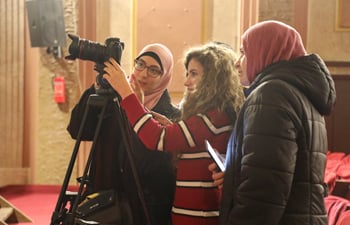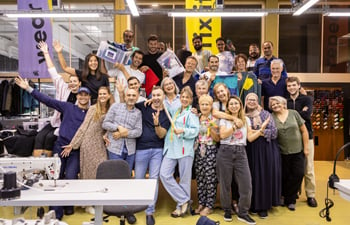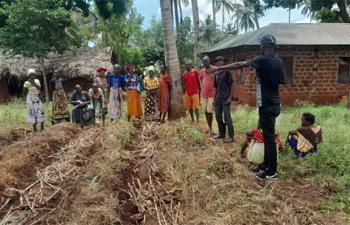LÍX (Somali for six) is a new performance by dancer and choreographer Mohamed Yusuf Boss. Mohamed came to the Netherlands as a child from Somali with his mother, brothers and sisters. With his multimedia dance performance LÍX, Mohamed makes tangible what it means to have a bicultural background. What this does to your understanding of yourself and the grip you have on yourself. Looking for more stories, he started a photographic series on Somali fathers. With camera in hand, he stepped into Somali communities in Groningen and Emmen and initiated dialogue. Mohamed explains why he wanted to produce this show.
Telling stories and sharing experiences
The stories of others and sharing experiences play a big role in Mohamed Yusuf’s work. With a background in hip-hop, he works according to the “each one teach one” principle: If you’ve learned something yourself, it’s your responsibility to pass on your acquired knowledge to another, and they in turn to another, so that ultimately the whole community benefits. The African philosophy of Ubuntu also plays a big role. Freely translated, this means “I am, because we are” and it stands for solidarity and community spirit: “in order to flourish yourself, you must first help others”. Mohamed: “With my performances, I use dance to tell stories and share experiences.”
A moment of reflection
Like many people from bicultural backgrounds, Mohamed often feels like he’s always riding the handbrake. Two cultures often differ in social behaviour, leading to questions such as “Is this allowed?”, “Do I belong here?” or “Is this from or for me?” Although having a bicultural identity presents challenges, it also gives you a unique view of the world. With LÍX, Mohamed wants to highlight both sides of this coin. He invites the viewer to reflect on what gives them grounding in their lives, with whom or what they identify and which aspects of themselves they want to highlight positively. Sometimes a bar is literally driven onto the stage for an after-dinner chat with the audience. Mohamed: “Dialogue and sharing stories is important. Nowadays, you have to relate to many things; your environment, the other person and yourself, while conclusions are all too quickly drawn and the tone hardens. By talking to one another, you see how another person sees you and that also broadens your own horizons.”
Personal stories through photographs
Photography plays a crucial role in preserving memories. Mohamed: “For me, photographs are the only tangible thing that remains of my past in Somalia.” He approached acquaintances from his Somali network and visitors to his earlier show, asking them if they would share their stories and personal photographs. The photos submitted show everyday scenes, but also rituals or dance expressions that in turn inspire the dancing and movement in the performance. From the submissions, 15 people were invited to the theatre for an interview and a photo. Mohamed: “We put them on a stage. And we use elements from their personal stories in the performance. Like the camel, the symbol of travel. But mourning also plays a big role. As a migrant, you have people who are here, who are still there and who are no longer with us. That dynamic plays a constant role.”
Mohamed: “What is always highlighted, when you leave your home country, is your flight, while you’ve had a whole life before and will have after. On arrival in the new country, you are asked to unpack your suitcase, although you live under the assumption that you are going back, so you leave your suitcase closed – for a very long time.” The first Somali refugees came to the Netherlands 30 years ago. “I was a child when I came here. Now I am a father myself and wonder: What will I pass on to my child? When will I finally unpack that suitcase?”
The performance LÍX by X_YUSUF_BOSS enjoys support from the VriendenLoterij Fonds (FriendsLottery Fund), which forms part of the DOEN Foundation.


